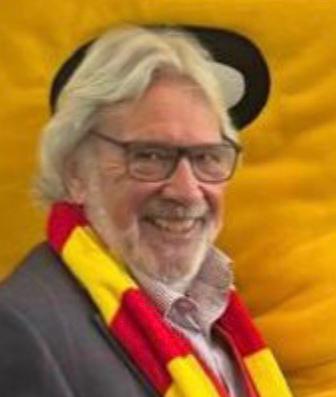People
Obituary-Robert Philip, talented sports writer and larger-than-life character
Thursday 4 September 2025
In an era of colourful characters on Fleet Street, Robert Philip, who has died at the age of 75, stood out as a larger-than-life personality with a comic gift, who could be relied on regularly to stir up controversy.
Robert, who died in Troon in his native Scotland on August 30 following a long battle with cancer, joined Reuters Sports Desk in 1980 after working for the Scottish Sunday Post.
A gifted writer, he regarded Reuters as a stultifying environment for creative reporting and made it his personal mission to inject colour and excitement onto the wire.
His boundless enthusiasm led to a few missteps, notably his description of the transfer of Scottish footballer Charlie Nicholas from Celtic to Arsenal in 1983 as “the most heralded arrival on these shores since Julius Caesar”.
His hyperbole drew howls of protests from Reuters journalists who felt he was devaluing the brand. Undeterred, Robert pressed on. Tennis queen Martina Navratilova was, he wrote, “a legend in her own mind.” Cue further outrage.
Eventually Robert and Reuters concluded that his talents might be better employed elsewhere and he joined the Daily Telegraph as a sports columnist, where he remained for 15 years. His approach remained undimmed and he stirred up the biggest controversy of his career at the World Athletics Championships in Edmonton in 2001 when he described the host city as “Deadmonton”.
His comments sparked a wave of near hysteria in the Canadian media with packs of journalists trying to hunt him down. In an attempt to repair Edmonton’s sagging reputation, the mayor invited Robert to take a helicopter flight over the city, but the tactic failed. On leaving his assignment, Robert wrote that he was sitting in Edmonton’s “most desirable attraction – the airport departure lounge.”
He had a natural ability to make people laugh and loved to hold the floor telling jokes. At the Calgary Winter Olympics in 1988 he was invited on stage to do a ‘turn’ at the Reuters opening party, but his performance fell a bit flat as the North American section of the audience could barely make out a word of his broad Glaswegian accent.
Robert had his abrasive side too, especially in his cups, and he could cause deep offence with some of his unfiltered comments, but his pranks and humour were legendary among Reuters colleagues.
My first encounter with him was unpromising. I was a correspondent in Bonn and he introduced an error into one of my stories and failed to correct it when it was pointed out. I phoned Sports Desk in London and he picked up and said that if I was calling about the correction, I could stick the phone somewhere where the sun didn’t shine. I was therefore apprehensive when I first worked on assignment with him, but we struck up an instant and lasting friendship. He was a warm and generous man and great fun to be with.
Robert, who lived most of his life in his native Glasgow, was first and foremost a football writer with a favourite joke that, growing up, he originally thought his beloved local team was called “Partick Thistle Nil” because they lost so often. But he had been a ranked tennis player as a junior and enjoyed covering that too. When I was in Paris we covered the French Open at Roland Garros together every year and it was his favourite tournament.
His fondness for Paris was probably enhanced by his stays in the luxury George V hotel on the Champs Elysees. In those good old days, Reuters paid correspondents’ mini-bar bills. Robert’s liberal use angered the Paris bookkeepers and was probably one of the reasons this perk was withdrawn by the company.
Even after being told his diagnosis was terminal 18 months ago, Robert had no self-pity and retained his sense of humour. His close friend and ex-Reuters colleague Steve Bierley recalls “At one point after a successful operation, the surgeon gave him the all-clear and told him he’d be able to play tennis and swim again.
“That’s great, said Robert, I couldn’t swim before.”
His crowning achievement was his book – Scottish Sporting Legends – published in 2012. The words Scottish and Legend fit him rather well.
He leaves his wife Yvonne, five children and four grandchildren.
■
- « Previous
- Next »
- 12 of 575